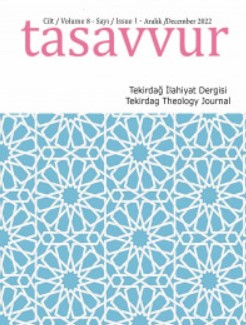Şemseddin es-Semerkandî’de Bilginin Tanımı Problemi
The Problem of Definition of Knowledge in Shams al-Dīn al-Samarqandī
Author(s): Mehdi CengizSubject(s): Epistemology, Middle Ages, Islam studies, Philosophy of Middle Ages
Published by: Tekirdağ Namık Kemal Üniversitesi İlahiyat Fakültesi
Keywords: Philosophy; Kalām; Knowledge; Definition; Avicenna; Fakhr al-Dīn al-Rāzī;
Summary/Abstract: The problem of definition of knowledge has been discussed in the tradition of kalām and philosophy. Especially with the inclusion of logic definition theory in the discipline of kalām, the definitions put forward were criticized by later thinkers. Shams al-Dīn al-Samarqandī (d. 722/1322), who was included in this discussion, which was mainly shaped around the question of whether knowledge is necessary (ḍarūrī) or acquired (kasbī), wrote the ideal definition and features in al-Meārif and commentary of Avicenna’s al-Ishārāt wa altanbīhāt. In addition, Shams al-Dīn al-Samarqandī examined the problem of whether knowledge can be defined and -like Fakhr al-Dīn al-Rāzī (d.606/1210)- argued that the meaning of knowledge is very clear. In this context, Shams al-Dīn al-Samarqandī, who criticizes the definition of knowledge put forward by the Peripatetic tradition in particular Avicenna (d. 428/1037), determined the ont and non-existent definitions of knowledge and criticized them. This study deals with how the ideal definition theory, which Avicenna founded, was handled by Shams al-Dīn al-Samarqandī and the problem of definition of knowledge according to Shams al-Dīn al-Samarqandī. In addition, with this article, it has been argued that Shams al-Dīn al-Samarqandī did not define knowledge.
Journal: Tasavvur Tekirdağ İlahiyat Dergisi
- Issue Year: 8/2022
- Issue No: 1
- Page Range: 161-183
- Page Count: 23
- Language: Turkish

